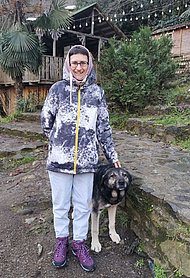You are here:
- Home
- Doctoral Programme
- Researchers
- Detail

Doctoral Project
Locality and Translocality of Artistic Communities from Saint Petersburg, Russia
I started working on the Ph.D. research proposal on the local scene of Saint Petersburg performance art and theatre, politically and socially engaged art, in 2020. After Russia’s full-scale invasion of Ukraine in February 2022, the political and social situation changed dramatically. For Russian citizens and people based in Russia, the war has its consequences: increasing repressions, mobilization, and the necessity of taking responsibility for their political positions and actions (past and present). Since the field of my study is a politicized art scene, it was influenced by Russian regime actions faster and to a greater extent than, for instance, institutional art.
In the first place, I was interested in performative tools for transforming the city space in various aspects: symbolic, political, aesthetic, communicational, and others. Currently, I will focus on connections between communities and the artistic and political strategies of those involved in the SP art scene. I had to redefine the spatial dimension of the research: the major shift is from studying SP as the physical location to examining it as the mental place (memorable, valued, abandoned, reconstructed, etc.).
My key questions currently are: How are relationships between artists maintained through translocal connections? Is there still some unity in the field? What is the variety of artistic, political, and biographical strategies of the artists who were a part of overlapped communities in SP and are now divided on those who have stayed and those who have had to leave the city? How do artists who consider themselves politically active: feminist, leftist, anarchist, making socially engaged, inclusive art projects, etc., rethink what “political” means for them in times of war?
At the moment, I’m also trying to reconsider the concept of the thesis and the whole idea of writing on Russian art to find ways of making it reflexive, appropriate in times of war, and clear in political, decolonial aspects and expressing solidarity with those who experience direct violence from Russian regime, language, and culture.
Curriculum Vitae
Marina Israilova studied Art History at the European University at Saint Petersburg (2014-2016) and Russian Literature at the Kemerovo State University (2004-2009). She worked, individually and collectively, on various projects as an interdisciplinary researcher, independent curator, art critic, editor, and teacher. Her research interests include performance art, public art, self-organized initiatives, artist-run spaces, translocal connections in contemporary art, feminist ethics, ethnography, and epistemology.
Since April 2023, Marina has been a Ph.D. student at the Graduate School of East and Southeast European Studies. Her Ph.D. thesis is at the intersection of art history, anthropology of art, and digital anthropology, with autoethnography as one of the critical methods.
back